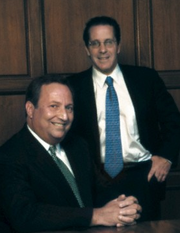Excerpt:
Report an Error
Jed Rakoff

Justin Maxon/The New York Times
Jed Rakoff is a United States District Court Judge for the Southern District of New York. He joined the federal bench in 1996 after his appointment by President Bill Clinton. His earlier career includes practice as a federal prosecutor and later as a defense attorney in cases of white-collar crime.
Judge Rakoff has a reputation for toughness. He can also be unpredictable, except, it seems, when dealing with the Securities and Exchange Commission.
On Nov. 28, 2011, Judge Rakoff threw out a $285 million settlement between the S.E.C. and Citigroup, saying that the S.E.C.’s policy of settling cases by allowing a company to neither admit nor deny the agency’s allegations did not satisfy the law.
He ruled that the S.E.C.’s settlement was “neither fair, nor reasonable, nor adequate, nor in the public interest” because it did not provide the court with evidence on which to judge the settlement.
Citigroup was charged with negligence in its selling to customers a billion-dollar mortgage securities fund, known as Class V Funding III. The S.E.C. alleged that Citigroup picked the securities to be included in the fund without telling investors, claiming that the securities were being chosen by an independent entity. Citigroup then bet against the investments because it believed that they would lose value, the S.E.C. said.
The same month, Judge Rakoff ordered the convicted hedge fund titan Raj Rajaratnam to pay a $92.8 million penalty, the largest ever assessed against a person in a S.E.C. insider trading case.
http://en.wikipedia.org/wiki/Raj_Rajaratnam
Excerpt:
Controversy
He has also contributed $3.5 million to the Tamils Rehabilitation Organisation (TRO), a group whose assets were frozen by the USA due to its alleged close connections to the Tamil Tigers (LTTE) which are proscribed as a terrorist organization in 32 countries.[22][23][24] TRO's offices were raided by the FBI in 2006 but the organization was never charged with any wrongdoing.[25]
Selvarasa Pathmanathan, who was appointed LTTE chief after the death of Prabhakaran has said that Rajaratnam contributed lavishly to the LTTE and its sympathizers in the West.[26]
The Sri Lankan government has stated that Rajaratnam had contributed for several years of the Sri Lankan Civil War to the LTTE with millions of US dollars and that he was under investigation in Sri Lanka.[27] However, the senior military official could not give specific details about the alleged contributions to the LTTE. Rajaratnam had recently pledged a $1 million to rehabilitate former LTTE combatants.[18]
[edit] Arrest for insider trading
| Wikimedia Commons has media related to: Rajaratnam wiretapped conversation |
On Friday October 16, 2009, Raj Rajaratnam was arrested by the FBI and accused of conspiring with others in insider trading in several publicly traded companies. U.S. Attorney Preet Bharara put the total profits in the scheme at over $60 million, telling a news conference it was the largest hedge fund insider trading case in United States history.[5][28] Jim Walden, an attorney for Mr. Rajaratnam, said his client is innocent and will fight the insider-trading charges.[29]
Rajaratnam allegedly profited from information received from Robert Moffat, an IBM executive, Rajiv Goel, an Intel Capital executive, and Anil Kumar, a McKinsey & Company executive. It was reported that Rajaratnam, Goel and Kumar were all part of the class of 1983 from Wharton business school.[30]
http://www.bloomberg.com/news/2010-09-13/moffat-gets-six-months-for-leaking-tips-to-chiesi-in-galleon-insider-case.html
Excerpt:
http://commons.wikimedia.org/wiki/File:GalleonWiretap_RajatGupta-RajRajaratnam.ogg
Excerpt:
No higher resolution available.
GalleonWiretap_RajatGupta-RajRajaratnam.ogg (Ogg Vorbis sound file, length 17m 50s, 43kbps)
[edit] Summary
| Description | English: Wiretap of call between Goldman Sachs director Rajat Gupta and Galleon Group founder Raj Rajaratnam. |
|---|---|
| Date | 29 July 2008 |
| Source | United States Attorney’s Office, Southern District of New York |
| Author | Federal Bureau of Investigation |
| Permission (Reusing this file) | See below. |
http://en.wikipedia.org/wiki/Shadow_banking_system
Excerpt:
The shadow banking system is the infrastructure and practices which support financial transactions that occur beyond the reach of existing state sanctioned monitoring and regulation. It includes entities such as hedge funds, money market funds and Structured investment vehicles. Investment banks may conduct much of their business in the shadow banking system (SBS), but they are not SBS institutions themselves. The core activities of investment banks are subject to regulation and monitoring by central banks and other government institutions - but it has been common practice for investment banks to conduct many of their transactions in ways that dont show up on their conventional balance sheet accounting and so are not visible to regulators.
http://romanticpoet.wordpress.com/tag/maurice-strong/
Excerpt:
Gupta, who has been a U.S. citizen since 1984, had a relationship with another Galleon case defendant, Anil Kumar, a friend and associate from his days at McKinsey. Kumar pleaded guilty Jan. 8 to leaking inside information to Rajaratnam over five years in exchange for $1.75 million. Kumar is now cooperating with federal prosecutors.
http://www.sourcewatch.org/index.php?title=Gene_B._Sperling
Excerpt:
Controveries
Top Negotiator of Glass-Steagall Repeal
Sperling also served as a principal negotiator with then-Treasury Secretary Lawrence Summers in finalizing the Financial Modernization Act of 1999, also known as Gramm-Leach-Bliley Act. Gramm-Leach-Bliley repealed large portions of the depression-era Glass-Steegal Act allowing banks, securities firms and insurance companies to merge. [1] President Barack Obama believes that the repeal of these depression-era protections helped cause the 2007 sub-prime mortgage financial crisis.[2]Top Negotiator of China-WTO Trade Deal
Together with United States Trade Representative Charlene Barshefsky, Mr. Sperling successfully negotiated and concluded the China-WTO agreement in Beijing in 1999, paving the way for China to enter the World Trade Organization in 2001. [3] The Economic Policy Institute estimates that 2.4 million U.S. jobs have been lost to China since 2001.[4]

No comments:
Post a Comment